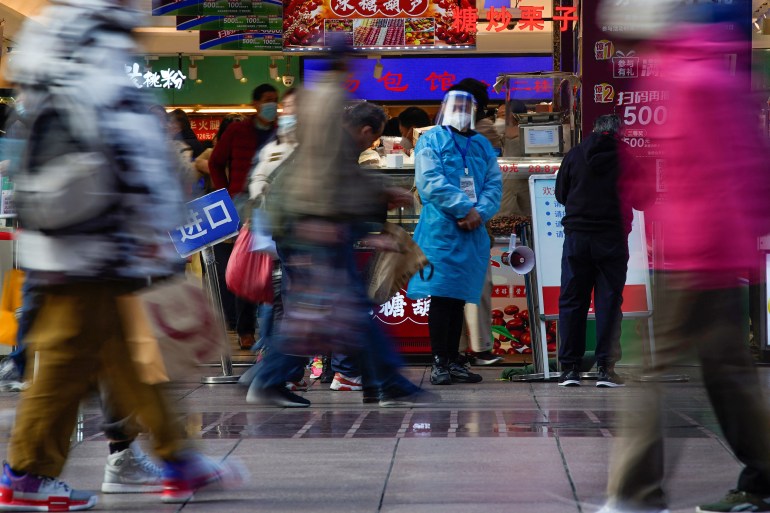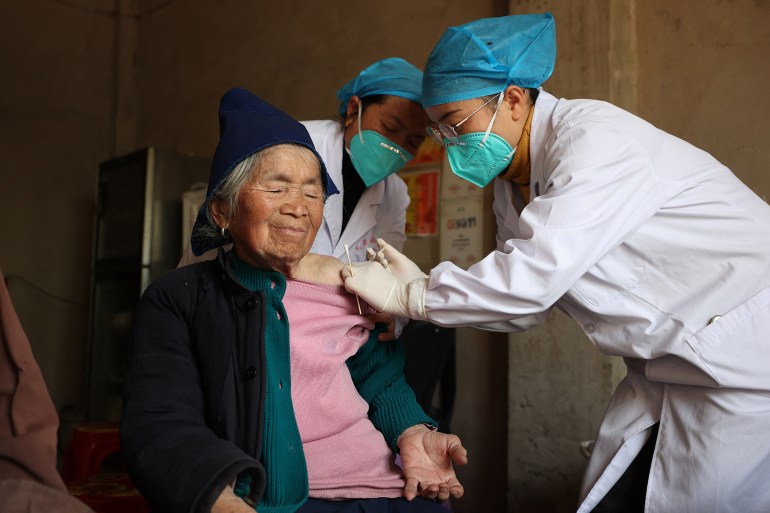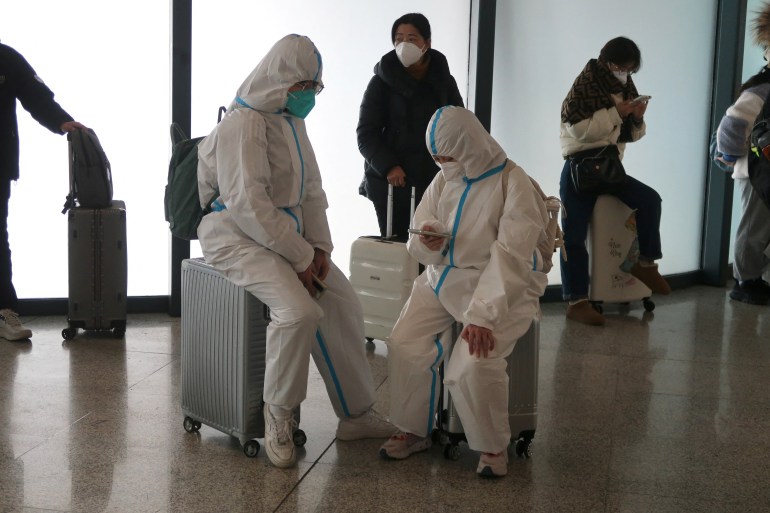Chinese struggle to ‘summon the courage’ to live with COVID-19
Hu Yuping is afraid.
The 43-year-old resident of the central Chinese province of Hunan is a cancer survivor and she has just learned that even though there are COVID-19 patients in her building, the two-week lockdown imposed to curb the virus’ spread is to be lifted.
“Wear your mask and don’t go to crowded places — we only have ourselves to rely on now,” Hu wrote in her family group chat on the messaging platform WeChat.
After nearly three years of a zero-COVID strategy that has sought to stamp out the virus wherever it has emerged with lockdowns, mass testing and centralised quarantine, China has suddenly begun to relax some of its most severe restrictions.
The shift in a policy that has held back growth in the world’s second-largest economy and disrupted the lives of millions of people came shortly after a wave of anti-lockdown protests swept across the country.
The relaxation of the policy has delighted many, especially those whose economic livelihoods have been harmed, but many are agitated about what might happen next, with health experts predicting a surge of coronavirus cases in a country where the vast majority of the people have not been exposed to the virus and many elderly people have not received full courses of the vaccine.
The zero-COVID strategy also means that since 2020, the Chinese government has been pushing a narrative of an unquestionably lethal virus and depicting the rest of the world’s decision to live with it as a dangerous move.

Still, it took the government no more than a few nights to begin dismantling the anti-pandemic regime it had so zealously built.
In the span of a week, the government dropped PCR testing requirements for entry to most public places, dismantled the national COVID-19 tracking app — a defining symbol of China’s anti-pandemic measures — and generally loosened up the other measures that had so constrained everybody’s daily lives.
‘Left out in the open’
The sudden change has left many confused and even — for people like Hu — fearful.
People with underlying diseases or whose immune system has been suppressed are known to be more vulnerable to COVID-19, and Hu has been treated for ovarian cancer.
She recently crossed the five-year mark since the last cancerous cells were detected in her body, a clinical sign that the disease has probably been suppressed, but she says she is “extremely nervous” at the sudden shift in COVID-19 policies and is cancelling all non-essential trips outside her home so that she does not “run any risk of infection”.
“The doctors say they are afraid of the side effects the vaccines might have on me,” Hu told Al Jazeera.
“But now, we are left out in the open, without vaccines and without state protection.”
Al Jazeera has spoken with five immunocompromised people who are not vaccinated. All of them told stories of how the government had been slow and unwilling to vaccinate them over concerns about the side effects.
Patients with underlying diseases are now afraid that they will not have enough time to get vaccinated before the virus hits their city or building.
“No one was rushed to get the vaccine before, but now even though we want to get the vaccine, doctors are hesitant because there is no guidance from the top,” said Ding Siyang, a dialysis patient in Kunming, a southwestern Chinese city, said. “We are all a bit afraid.”

The country’s large elderly population is also fearful. Despite the government’s effort to rush to inoculate the elderly population after the relaxation of the policy, just 60 percent of the people above 80 years old have been boosted according to the National Health Commission. A study conducted in Hong Kong has shown elderly people vaccinated with Chinese-manufactured COVID-19 vaccines only have enough protection against severe disease after the booster shot.
As a result of the relatively low vaccination rate among vulnerable people, experts have predicted a sudden surge of cases in the depths of winter in China that could overload the limited medical resources in the planet’s most populous country.
Facing the inevitable wave of COVID-19, vulnerable people are not the only ones who are fearful.
After the relentless messaging of the past three years, there is also anxiety among the young and the healthy — people who, in conventional wisdom, should be better able to cope with the disease.
Experts have been studying the effect of prolonged lockdowns on people’s mental health since COVID-19 first emerged in Wuhan three years ago and the city of 8.5 million was sealed off.
The Lancet, one of the world’s leading medical journals, citing the first national survey on psychological distress in the COVID-19 pandemic in China from 2020, noted “35 percent of respondents experienced distress, including anxiety and depression”.
“School closures were associated with adverse mental health symptoms and behaviours among children and adolescents,” it added, noting that the relief when Wuhan’s lockdown was finally lifted was tempered by “widespread anxiety over adapting to routine life and fear that transmission of the virus will rebound”.

Since then, the sporadic but prolonged lockdowns in China have made many people “tired and depressed,” according to Xiao Lu, a Shanghai-based psychotherapist.
“Being separated with friends and family over fear of this disease that many were fearing is a major trigger for a lot of people,” she said.
Lu Xueqin, a 35-year-old resident of Changsha in central China, is vaccinated and boosted with China’s domestically-manufactured vaccines but finds her mind going back to the early days of the pandemic when medical resources were pushed to the limit.
“I really don’t want us to go back to those days,” Lu said.
Since Wuhan in early 2020, vaccines have been developed and the virus itself has evolved. The difference between then and now is evident: the extra protection provided by a wide array of vaccines, and better treatments mean the wave of Omicron variants has been more widespread but less severe.
In China, however, Beijing’s fearmongering depiction of the virus since Wuhan has made it more challenging for people to face a future of living with COVID-19.
“Anxiety will almost inevitably shoot up for many people who had previously thought getting infected with the coronavirus was almost like a death sentence,” Xiao Lu told Al Jazeera.
Even though top-level experts have gone on national television to inform the public that the new variant is not as lethal as the one that ravaged Wuhan in the early days of the pandemic, the fear is pervasive.
Lu worries that unless the government updates the public more aggressively about the changing nature of the infection, many more are going to suffer from anxiety and even depression.
“It’s scientifically studied that uncertainty further stokes anxiety among people who are prone to [anxiety], and a change in policy without proper communication with the public will make matters worse,” she added.
Such uncertainty and fear could have long-lasting effects as cases surge amid looser controls.
“Currently, the epidemic in China is … spreading rapidly, and under such circumstances, no matter how strong the prevention and control is, it will be difficult to completely cut off the transmission chain,” Zhong Nanshan, a top government health adviser, told state media on Sunday.
In a survey conducted earlier this month by consultancy Oliver Wyman, among the 4,000 consumers asked, fear of infection with COVID-19 was the top concern among those who said they would not be travelling.
“You must be kidding,” Lu answered when asked whether she plans to travel from her home in Changsha as the rules relax. “I can barely summon enough courage to leave my house now.”



